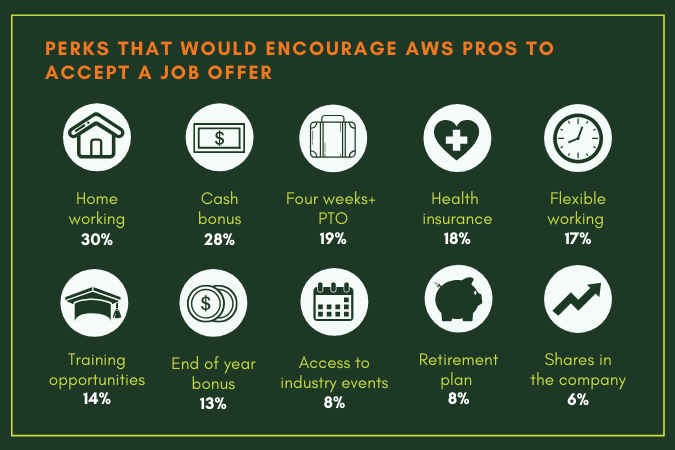What matters to AWS professionals: How to keep your cloud talent happy
By Nicola Wright

Cloud talent isn’t exactly falling from the skies in today’s market.
As more businesses take their operations and processes to the public cloud and utilize more smart platforms, competition for cloud professionals is becoming increasingly fierce. The fact is that there simply aren’t enough cloud tech pros to go around, which means that keeping hold of the talent you have is more important than ever.
If you’ve managed to land a skilled and experienced cloud developer, engineer or architect, you’re already beating the odds. But you can be sure as eggs is eggs that your top cloud pros are facing temptation from all angles as other organizations attempt to lure them away.
So how do you make sure that your employees aren’t about to jump ship? Finding out what’s most important to them in a job is the first step toward keeping them happy, and keeping them under in your business.
As part of our recent survey of AWS professionals, we asked thousands of cloud experts across a myriad of job roles about job satisfaction, most valued work perks, and what they love (and don’t love) about their employers.
How do AWS professionals feel about their jobs?
We asked our survey participants to tell us how satisfied they were with various aspects of their working life.
Almost two-thirds of respondents told us that they were satisfied with their current role overall. A quarter reported that they didn’t feel strongly about their job one way or another, and 12% said they were dissatisfied with their position.

Overall job satisfaction:
- Satisfied — 63%
- Neutral — 25%
- Dissatisfied — 12%
If we drill down a little further, we can see that the most common causes of dissatisfaction with our respondents’ careers were professional progression, the benefits they receive (or don’t, as the case may be), and training and development opportunities.
Only 16% of our cloud pros were unhappy with their salaries, illustrating that, while offering a competitive compensation package is vital to keep employees happy, it’s not the be-all and end-all.
| Job satisfaction by factor | Satisfied | Neutral | Dissatisfied |
| Work hours | 78% | 15% | 8% |
| Location | 70% | 18% | 11% |
| Office environment | 61% | 22% | 14% |
| Company culture | 61% | 21% | 17% |
| Salary | 61% | 23% | 16% |
| Training and development | 52% | 26% | 20% |
| Benefits | 50% | 29% | 19% |
| Career progression | 47% | 26% | 23% |
| Overall job satisfaction | 63% | 25% | 12% |
What makes AWS professionals leave jobs?
So, of these bones of contention for AWS professionals, which were the most likely to drive them to change jobs?
A quarter (25%) of permanent employees who responded to our survey expected to leave their employer within 12 months, with a further 29% unsure whether they’ll stay or go.

Why do AWS professionals leave jobs?
- Lack of salary increase — 38%
- Lack of career prospects — 37%
- Need new challenges — 32%
- Lack of exposure to new products — 28%
- Lack of leadership — 26%
- Company culture — 22%
- Desire to work remotely — 18%
- Lack of training —15%
- Lack of flexible working — 11%
- Desire to relocate — 11%
Of those who planned to jump ship in the coming year, 38% told us that their main reason for leaving would be a lack of salary increase. An absence of pay rises only very narrowly beat out the second- and third-ranking motives: a dearth of career and promotional prospects, and the need to take on new challenges.
These results indicate the importance of providing a clear and structured career path for all employees and making sure they know you have plans for their career long-term. Without a future ahead of them, your employees are likely to become frustrated and demotivated, causing them to seek out a change of scenery.
Less than half (49%) of respondents said they were happy with the training they receive. Only 15% of those intending to leave their current role cited a lack of training as the primary reason they’d seek new employment, but given what an essential role training plays in professional development, it’s clearly not something to be undervalued.
What do AWS professionals value?
Alongside providing signposted career pathways for your cloud teams, what else can organizations offer to keep employees happy?
As we mentioned before, you don’t always have to write a bigger cheque to land the best talent. These days, a great job is about more than how much money you’re offering; it’s about culture, opportunity, and achieving work-life balance.

Perks that would encourage AWS pros to accept a job offer:
- Home working — 30%
- Cash bonus — 28%
- Four weeks paid time off — 19%
- Health insurance — 18%
- Flexible working — 17%
- Training opportunities — 14%
- End of year bonus — 13%
- Access to industry events — 8%
- Retirement plan — 8%
- Shares in the company — 6%
This is where offering an attractive package of perks and benefits can make all the difference. We asked our professionals what perks were most likely to tempt them to accept another job offer.
Demonstrating how highly today’s workforce value the ability to manage their own time and work on their own terms, perks related to flexible working accounted for three of the top five answers given.
Of course, many factors contribute to job satisfaction, and maintaining an open dialogue with your employees and understanding what their career goals are is the best way to make sure that you’re on the same page, and they stay under your roof.
How much should you be paying your AWS professionals?
Find out the latest salary averages for AWS professionals across the world with the Jefferson Frank Salary Survey; the ultimate guide for anyone looking to build a rewarding career in AWS.
Download the survey
Einblicke in den AWS-Markt
AWS-Jobs nach Ort
- AWS Jobs in Australien
- AWS Jobs in Österreich
- AWS Jobs in Belgien
- AWS Jobs in Bulgarien
- AWS Jobs in Tschechien
- AWS Jobs in Dänemark
- AWS Jobs in Finnland
- AWS Jobs in Deutschland
- AWS Jobs in der Schweiz
- AWS Jobs in Ungarn
- AWS Jobs in Irland
- AWS Jobs in Italien
- AWS Jobs in Luxemburg
- AWS Jobs in den Niederlanden
- AWS Jobs in Norwegen
- AWS Jobs in Polen
- AWS Jobs in Rumänien
- AWS Jobs in der Slowakei
- AWS Jobs in Südafrika
- AWS Jobs in Schweden
- AWS Jobs in der UK
- AWS Jobs in den USA